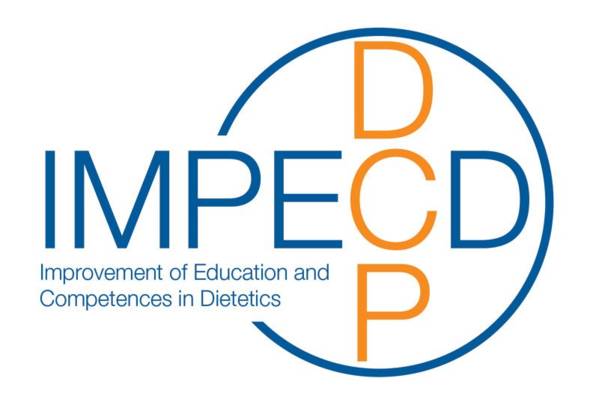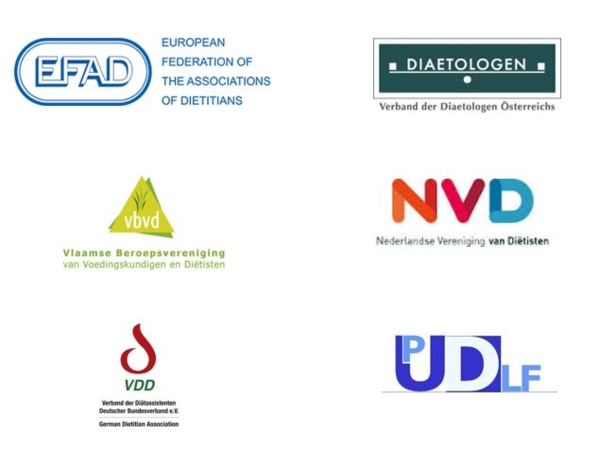Networking and further development of training and teaching programmes in dietetics/dietology

Nutrition and european networks
Non communicable diseases (NCDs) take 38 million people’s lives each year worldwide (1). In Europe NCDs are the leading cause of morbidity and mortality. The World Health Organization (WHO) and the European Union (EU) have recognized the importance of nutrition in prevention and treatment of NCDs (2; 3). Dietitians play an important role in the prevention of NCDs and in patient care of several diseases (4).
Dietetics is a relatively young discipline at HEIs in Europe and differences in curriculum and thus education still exist. An example of the differences encountered is the “Dietetic Care Process” (DCP) or “Nutrition Care Process”, which is of key concern to all dietetic professionals. It is a systematic approach to recognize, diagnose and intervene in nutrition related health concerns. It improves consistency and quality of dietetic care and the predictability of outcomes, ensures evidence-based practice, and supports critical thinking as well as decision-making in all areas of dietetic practice (5).
Worldwide and within Europe different frameworks of DCPs are used e.g. differences in the number of steps or used terminology. Equally important, each step should be strengthened by evidence-based recommendations, which are still not available for Europe. Furthermore, not all countries use a standardized language in dietetics (6). Thus implementation of international research projects, comparability of project results, agreement of the most efficient therapies and cross border mobility for professionals is difficult.
Lifelong Learning, open online courses and virtual patients
Moreover, there is a substantial need for innovative learning materials. Different learning materials for the training of the various DCP are available, but unfortunately none use an innovative learning approach or are free for use. Therefore, another key output of this project is a Massive Open Online Course (MOOC) based on the unified framework DCP and free for use.
The project will be a role model for all of Europe and other HEIs will be encouraged to implement the unified framework DCP and the MOOC. IMPECD addresses also the Education and Training 2020 strategy of the EU (7).
Health professionals need to be trained to use new technologies as well as to provide innovative means of health care aimed at improving patient care (8). Therefore a Strategic Partnership composed of five European institutions of higher education (HEI) has been formed to enhance the quality of dietetic education.
Project goals
- unify the framework Dietetic Care Process (DCP)
- produce a Massive Open Online Course (MOOC), free for use
- implement two Intensive Study Programs (ISP) to test the MOOC and evaluate the materials
- set up a syllabus and implementation guidelines to disseminate the results
- improving quality and relevance of dietetic higher education in Europe
- improving key competences including English language, digital competences, knowledge and understanding of dietetics, dietetic process as well as professional reasoning
- building professional relationships, autonomy and accountability
- research and development in dietetics and thereby increasing employability
- support discussions concerning a dietetic standardized language
- support Life Long Learning for dietitians
Output of the project include a unified framework DCP, as a basis for the development of clinical cases, and the production of the innovative MOOC, which is embedded in the IMPECD-platform and available 3 years after the project has ended. Furthermore, pedagogical training materials are developed to present the clinical cases on the MOOC and for the development of the contents of the two ISPs. A syllabus is compiled and addresses the other European universities as a guideline to implement the mentioned results within the curriculum. To disseminate the results as a role model for Europe, implementation guidelines are compiled as a discussion basis for the stakeholders. These results will support the development of a unified framework DCP and the discussions about the implementation of a standardized language in the field of dietetics. Furthermore, quality and relevance dietetic higher education improves and Life Long Learning will be supported and serves as basis of excellent dietetic therapy in all of whole Europe, which lead to cost savings in the health care sector.
Funding
This project has been funded with support from the European Commission. This publication reflects the views only of the author, and the Commission cannot be held responsible for any use which may be made of the information contained therein.
Sustainability & Impact Board
Publications
Video
Campus Talk (in german)
Press coverage
Virtuelle Patienten erhalten Ernährungstherapie
07/14/2017Medium: Die Presse
- University of Applied Sciences Neubrandenburg, Germany:
- Prof. Dr. Luzia Valentini,Dipl.Med.päd. Sabine Ohlrich, Dr. Daniel Buchholz(09/2015-12/2017), Karoline Lange,Msc, Shelly Rachman-Elbaum, MSc
- University of Applied Sciences Fulda, Germany:
- Prof. Dr. Kathrin Kohlenberg-Müller, Prof. Dr. Sigrid Hahn, Christina Gast
- Artesis Plantijn Hogeschool Antwerpen, Belgium:
- Koen Vanherle, Veerle Van Vlaslaer, Marijke Meeusen, Marleen Adam, Eline Baete, Hanna Aerts (09/2015 – 12/2016), Bente Le Bruyn
- Hanzehogeschool Groningen Stichting, Netherlands:
- Andrea Werkman, Maaike Roemeling-Walters, Renate Heine-Bröring
- Sustainability and Impact Board:
- European Federation of Associations of Dietitians (EFAD)
- European Network of Dietetic Students (ENDietS)
- http://www.efad.org/everyone
- Austrian Association of Dietitians
- http://www.diaetologen.at/
- German Dietitian Association
- http://www.vdd.de/servicenavigation/english/
- Nederlandse Vereniging van Diëtisten
- http://www.nvdietist.nl/
- Vlaamse Beroepsvereniging Voedingskundigen en Diëtisten
- http://www.vbvd.org/
- Union Professionnelle des diplômés en Diététique de Langue Française (UPDLF asbl)
- http://updlf-asbl.be


